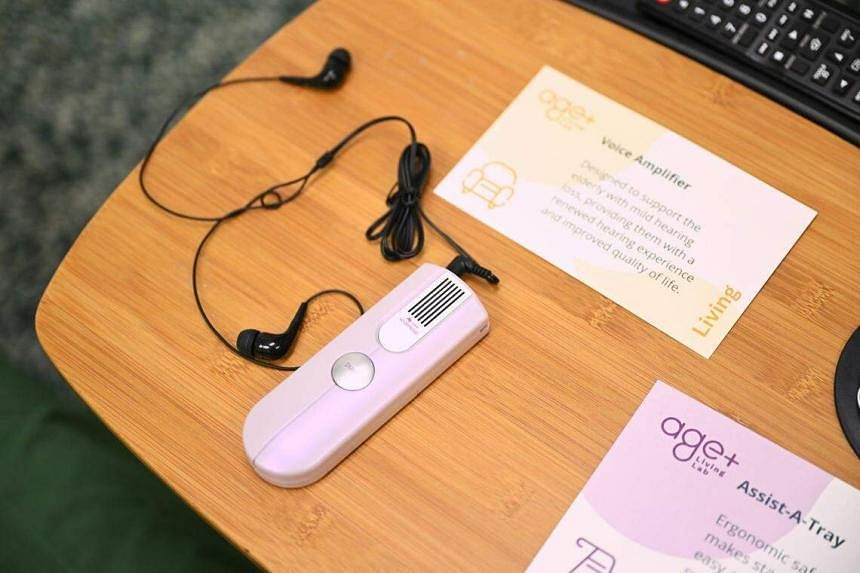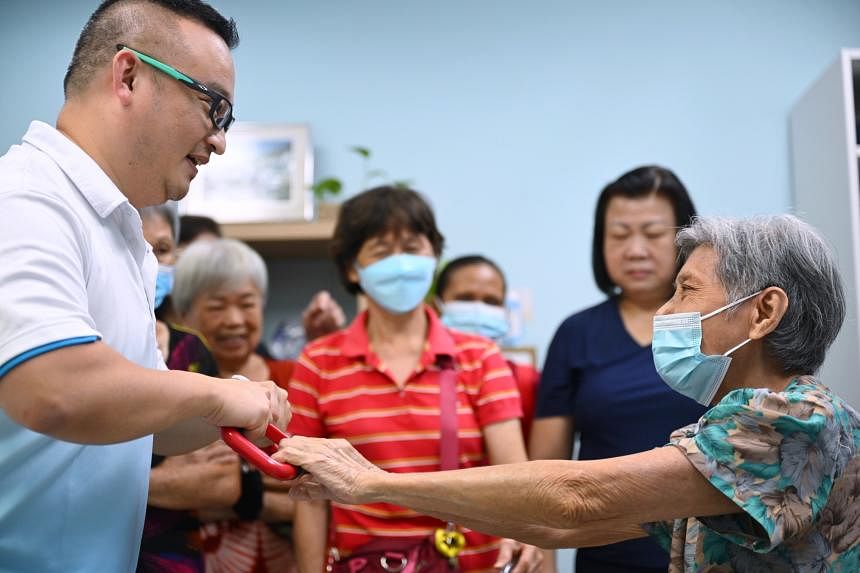SINGAPORE - Interested households can opt for a fall detection package from April 1, arranged by the Housing Board as part of efforts to improve the living environment of seniors and support their ageing in place.
Outlining plans to introduce assistive technology and products to HDB flats, Minister for National Development Desmond Lee said there is a pressing need to prepare for a society in which Singapore has more seniors, and to help them live independently.
HDB will arrange for commercial vendors to offer these packages, he said, adding that more details will be released at a later date.
Mr Lee, who is also Minister-in-charge of Social Services Integration, was speaking on March 15 at the launch of a new space for seniors and their caregivers at Block 839 Yishun Street 81.
Called the Age+ Living Lab, this simulated home environment is equipped with assistive products for seniors and aims to educate caregivers and seniors about assistive tools and gerontechnology, or gerontech – technology that helps to meet the needs of seniors.
One example of a fall detection solution already available is a fall monitor designed by local technology provider iWow. It can be mounted on a wall, and alerts a 24/7 response centre manned by social enterprise SG Assist when it detects that someone has fallen.
Another example is a floor mat that uses motion sensors to detect when someone has fallen. It then triggers an alarm to alert caregivers that the individual needs help.
One in four individuals will be 65 and older in 2030, said Mr Lee, and this lab, a collaboration between SG Assist and the Singapore University of Social Sciences (SUSS), is an example of how Singapore can prepare for its ageing population.
“This is a resource centre where our seniors as well as their caregivers can explore, try out, feel, and touch assistive products that can enable their loved ones, the seniors, to age in place more confidently and to help lessen the load on caregivers,” Mr Lee said.
This initiative aligns with national programme Age Well SG, which helps seniors age actively and independently, he said. Other initiatives planned include more active ageing centres, as well as more features under the Enhancement for Active Seniors 2.0 scheme.

At the launch, SUSS provost Robbie Goh said the lab helps the public to learn about assistive products that can support the changing needs of Singapore’s ageing population.
The simulated home environment, he added, showcases products that focus on four aspects of daily life – medical, dining, living and mobility.
“These displays are carefully selected to inspire ideas on how living spaces can be equipped to maintain and improve seniors’ quality of life while easing the burden on caregivers by promoting independence,” Professor Goh said.

Products currently displayed at the showcase include utensils that counter hand tremors, rubber grips for doorknobs and sound amplifiers for seniors with hearing loss.
The use of these will be demonstrated by volunteers or gerontech senior ambassadors (GTAs) during guided tours, which will help seniors and caregivers understand the importance of these tools and how to use them, Prof Goh said.
Residents who are interested in a tour of the lab can register at the SUSS website, and those keen on purchasing any of the devices can approach SG Assist.

Seniors are often unsure of the help they require and unaware of the technology that is available to them, and thus, many of them resort to staying at home due to a fear of falling, SG Assist’s co-founder Adrian Tan told The Straits Times.
“Seniors continue to shower standing up, for example, even when it is safer for them to sit down on a shower chair,” Mr Tan said. “But it will never occur to them that there is a need for them to make such a change until something bad happens.”
This is why fall prevention is important, he added, as injuries like hip and wrist fractures affect seniors’ mobility and will lead them to have a lower quality of life.
Madam Leanne Yu, 62, is the primary caregiver to her elderly parents who are in their 90s, and although they are independent, she said, these assistive products help improve their daily lives.

One product she uses daily is the sound amplifier, which she speaks into to make her voice louder.
“My parents are hard of hearing, and in the past, I always had to shout to communicate with them,” Madam Yu, who is a GTA, said.
She said it was a slow process to get her parents to accept the technology, as they needed time to get comfortable with new products.
She sees similar hesitation in many seniors as well, but she hopes they will be open to the idea of using assistive devices to help them age better when they see how they work.
“These tools are very helpful, I have seen how they work for my parents,” Madam Yu said. “I hope more seniors will feel confident and capable using technology to age in place comfortably and independently.”


